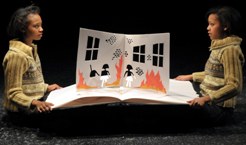Garage Repertory At Steppenwolf: Two Out Of Three Ain't Bad
By Julienne Bilker in Arts & Entertainment on Mar 22, 2010 9:40PM
Steppenwolf's Garage Theatre is currently playing host to three productions from three of Chicago's small theatre companies: punkplay (Pavement Group), The Twins Would Like To Say (Dog & Pony Theatre Company), and Adore (XIII Pocket). We enthusiastically recommend two of them.
punkplay production photo by Peter Coombs
Lane and Farabee play off each other exceedingly well, and their strong performances are supported by Tanya McBride and Keith Neagle, who are spot-on in their multiple roles (particularly Neagle as Chris Sawtelle, the local subject of the boys' punk-idol-worship). The other important supporting factor here is impeccable design. We're normally put-off by multiple costume changes that aren't strictly necessary, but David Hyman's work supports the story without being intrusive. As set designer for all three Rep shows, Grant Sabin has flexed a huge amount of creative muscle - punkplay's seemingly simple set is incredibly functional, able to transform the space depending on where the boys are in their punk progression, as well as fun. We won't ruin the surprise, but the homage to Pee-Wee's Playhouse is what makes the show's dream sequence one of the funniest we've ever seen. That, and McBride's turn as President Reagan.

The Twins Would Like To Say production photo by Peter Coombs
June and Jennifer's extreme isolation was seemingly a catalyst for their creativity, as both became prolific writers of poems and short stories. Several of their (mostly escapist but uniformly disturbing) stories are presented toward the end of the play, with the audience seated in a more traditional style - sort of. Our spot happened to be in the girls' bedroom, right next to one of their beds. As the twins, Paige Collins and Ashleigh LaThrop fill their silence with incredible power, making it pointedly disorienting for us to share proximity and perspective with them for those few minutes. We liked it. The ensemble is strong all-around, but Collins and LaThrop are mesmerizing.